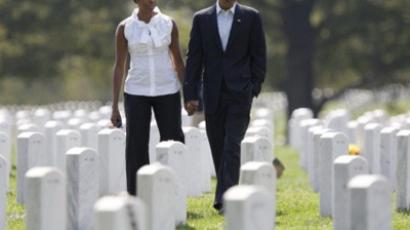US war woe: Suicide kills more soldiers than combat
When guns fall silent and ceasefires are agreed, wars live on in the minds of the men and women who fought them. And a killer still stalks them, more deadly than the enemies they once faced.
Being in a conflict environment is killing US soldiers. But surprisingly, the biggest killers are not enemy combatants.For the second year in row, more US soldiers killed themselves than were killed in combat. In 2010, 468 soldiers took their own lives, compared to 462 killed in fighting.And even off the battlefield, suicide rates continue to soar.Matthis Chiroux is an Afghanistan war veteran turned anti-war activist.“I unfortunately inhabit the demographic in the United States that kills itself, pretty much more than any other out there,” he told RT. “We come home feeling terrible, despicable about what we did and what we saw.” Chiroux is one of thousands returning from deployment feeling detached and conflicted.“The laws of decency don't apply to soldiers in combat and when you go back to having to apply those laws to yourself all the time that, for many, leads either to the grave or to jail,” he explains. An average of 18 veterans per day commit suicide and many more attempt it. Last year, 20 per cent of America’s 30,000 suicides was a soldier or veteran. Dr. Jan Kemp, a director of the National Mental Health Program, says many soldiers come back feeling disconnected from the world in which they once lived. “It kind of accumulates in disaster. You really start to wonder if you're ever going to be who you were again,” she explained to RT. “Then all of a sudden, they're back. Things happened in their families while they were gone. The situation they come back to is often not the same as when they left.”In fact, many come back to bleak situations.A quarter of the homeless in America are military veterans. The unemployment rate among vets hovers above 12 per cent.Meanwhile, campaigns such as “Army Strong” glorify life as a soldier, and aim to entice America’s young men and women to enlist.Since retiring from the army, Matthis Chiroux has been committed to showing students the other side of the army experience – the side recruiters fail to mention.“The unfortunate thing is [what they show] is not the military experience. It’s an advertisement,” he explains to a group of young people who have come to listen to his talk.It’s all part of the “We are not your soldiers” lecture tour. His message is clear. – “Don't become one of us!”It is a message he hopes will prevent more students and young people from becoming another grim statistic.














